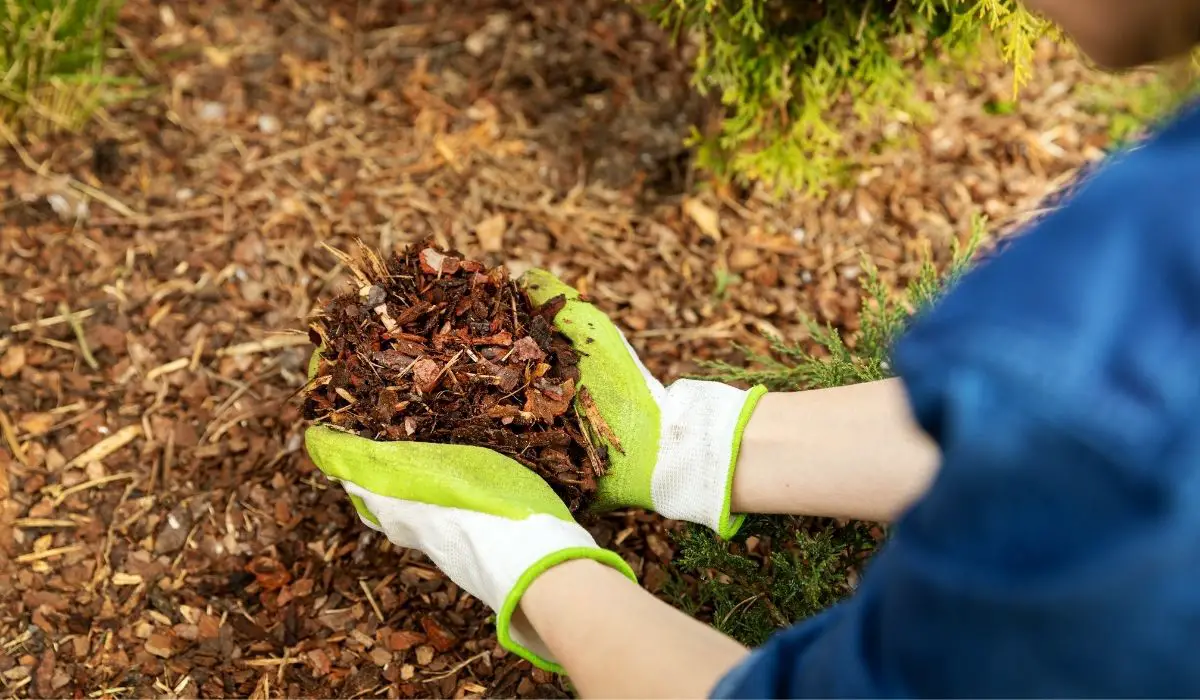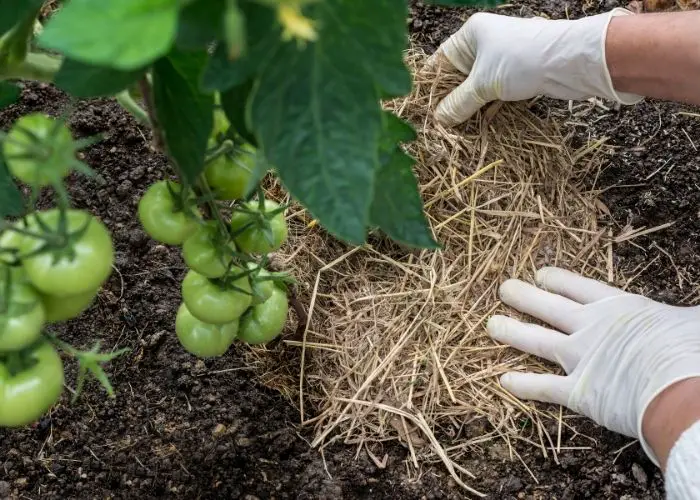Last Updated on January 24, 2023 by Tony Manhart
We usually plant tomatoes in the spring when there are lots of great mulch options. For example, are pine needles good mulch for tomatoes? Finding the proper mulch is a big reason why some of those tomatoes will grow well, while others will not.
It’s important to understand why some plants fail to thrive and how to prevent or remedy poor performance in tomatoes. Some say pine needles work great while others dislike them – here are our 2 cents on the subject.
What is a Mulch?
A mulch is an organic layer of plant material that we place over the soil. This mimics the natural conditions in nature, where plant matter falls on the surface of the soil and breaks down releasing nutrients and providing energy to bacteria, fungi, and creatures that keep the soil fertile. I believe in mulching heavily – adding up to two feet of mulch to my half-acre garden every year.
My mulches of choice are, in order of preference, pine needles, leaves in general, lawn clippings, and every two years I like to add pine bark mulch. I have tried wood chip mulches, but have found adding these directly to my soil depleted nutrients – I prefer to put wood chips on my paths and allow these to biodegrade for a year or two and then add this dark compost to the soil as a mulch later.
What is Pine Mulch?
Pine mulch is normally a milled pine bark material that you can buy. I believe very much in using this – every two years – as it helps to build humic substances in your soil and improves soil structure, water retention, and the ability of microbes in your soil to fix nitrogen from the atmosphere. If you add pine mulch too often, however, it appears to reduce soil fertility.
Pine mulch is most commonly used in landscapes and garden centers because it is a safe, long-lasting, and affordable choice for any gardener. It also works very well in vegetable gardens as well as in flower beds.
In this article, however, we are referring to Pine Needle Mulch – ie if you rake up the needles, or collect mulch from under pine trees, it is the mixture of needles and composted needles that are referred to as pine needle mulch. This is different from pine mulch which normally refers to milled pine bark that is a by-product of the lumber industry.
Read more about Best 7 Step Process To Growing Beefsteak Tomatoes (Without All The Hassle)
Why Are Pine Needles Good Mulch For Tomatoes?
It turns out that pine needles make good mulch for tomatoes because they have a lot of energy in them to drive nitrogen-fixing bacteria in them. If we look at much of our bodies, the more complex bits involve fancy molecules with nitrogen in them. Proteins are a good example. Proteins cannot exist without nitrogen. Without proteins, life cannot exist. Nitrogen is present in the air as a gas and to move this out of that state into a state where it is useful (ammonia, nitrate, and similar compounds) requires a lot of complicated chemistry and energy. Nitrogen likes to be a gas, and to stop it from being a gas is a big battle that uses a lot of energy.
Commercially, natural gas is reacted with atmospheric nitrogen in huge petrochemical-driven fertilizer plants to produce ammonia. Given geopolitical issues about where gas is, and who controls it, this means that nitrogen fertilizer is a political tool, and the people who control nitrogen, control protein – ie – we are protein, and whoever controls the fertilizer has a lot of power over us.
In nature, a much slower process used bacteria to convert stored energy in organic material into energy needed to fix nitrogen. Nitrogen-fixing bacteria are a major tool for all of us to employ to reduce our dependence on fertilizers that can be used to control us politically.
When you use a bag of pine needles as mulch, the bacteria use the energy in the mulch to fix nitrogen in the air and convert it into fertilizer that the plants can absorb.
What Are The Benefits Of Mulching Your Tomatoes?
Mulching your tomatoes encourages root growth and prevents weeds from growing. A mulch layer, if it is thick enough, generates enough microbial activity to actually warm your soil. I use this as a trick to get my plants into the ground a bit earlier. If you have a thick pine needle mulch over your soil, it will begin to generate a little heat. This makes your plant’s roots grow faster when the soil would normally still have been quite cold.
You can use a cloche to protect your plant during the final colder days of spring when a frost could still happen. I have a few purchased cloches, and then I just collect bottles and see-through tubs that work just as well.
You can pack the pine mulch right around the side of the cloche, and this helps to warm it. Naturally do not cover the top, as the light needs to get in. Once the plant touches the top of the cloche, and the weather is warm enough, you remove it, and let the mulch touch the plant stem. This will inhibit weeds.
Is it OK To Put Pine Needles Around Tomato Plants?
Yes, but only if you’re careful to water them. Are pine needles good mulch for tomatoes if placed close to the plant? Yes. Pine needles are rich in terpenes (resinous compounds) that actually chase certain insects away, and as the needles break down, the nutrients released will feed the roots of your plant. The needles are also an excellent barrier to moisture loss from the soil.
What Kind of Mulch is Best For Tomatoes?
The main reason to put mulch around your tomato plants is to conserve water. But mulching also protects the soil from being eroded. To figure out the best kind of mulch for your garden, consider what kind of environment you live in. I find that any organic matter placed on top of the soil is better than none. So, if you are in an area where pine needle mulch is abundant, learn how to use it. In my area, I add a little gypsum to my soil every few years as I find this, in combination with pine needles works magic on soil friability.
If you want to be really fancy, adding a bit of Trichoderma to your soil also helps a lot. Building up soil fungi is one of the fastest ways to build up your soil and ensure that your plants are healthy, disease free, and produce the best-tasting fruit.
Learn more about What Is The Best Mulch For Tomatoes In Containers?
So, Are Pine Needles Good Mulch For Tomatoes?
Yes, they are! Pine needle mulch is a valuable mulch material for organic gardeners who value biodiversity and are looking for a natural method to control weeds, insects, and pests. Mulching with pine straw increases soil temperature, improves water retention, and makes a rich, dark environment for soil-dwelling organisms. The pine straw decomposes and turns into humus over time, adding nutrients to the soil that would otherwise be lost to leaching.
It is not advisable to grow tomatoes in the same spot two years in a row – rotate them around your garden rather than avoid disease build-up in the soil. I find that the soil that I have mulched with pine needles and grown tomatoes on in summer does very well for my autumn and winter fava bean crops in my area. Fava beans enjoy soil that has been depleted of nitrogen, but that is rich in organic matter. Tomatoes mulched with pine needles provide you with that soil at the end of their season. The fava beans restore the soil fertility during their growth cycle and you can then use that soil for a crop such as potatoes.
Pine straw is also a good way to deal with the invasive and noxious weeds that can grow in gardens. Pine straw is also a good mulch choice for trees and shrubs as it helps to prevent soil erosion and helps to retain moisture.
Final Words On Are Pine Needles Good Mulch For Tomatoes!
In conclusion, You should try mulching pine needles in your tomato garden to improve the soil and reduce the number of pests, but it depends on your location and what your goals are. Pine needles have long been a traditional mulch for many vegetables and fruit trees. The leaves and bark are also good organic matter for the soil and can protect against erosion and water runoff.
FAQ
Can I use pine needles for mulch in my vegetable garden?
Pine needles are a great source of nutrients for plants, including mulch, but if you don't want to use them, you can buy mulch from a garden store. Pine needles are just a nice-to-have in my opinion, they have a lot of nitrogen, phosphorus, potassium, calcium and magnesium. They're also an excellent source of iron.
What vegetables benefit from pine needles?
I think the question is more, what vegetables will not benefit from pine needles? I have not encountered such a plant yet. There are urban legends about pine needles making the soil acidic - this is not true. You can use them around pretty much anything in the garden from corn, to cabbage, to tomatoes, peppers, spinach, swiss chard, beans and peas.
What is the best mulch for tomato plants?
I like to make a mulch that is a mix of pine needles, composted oak leaves, composted wood chips and milled pine bark. I add a bit of chicken cage manure to this and produce more tomatoes than I know what to do with. Buckets and buckets of tomatoes. You get sick of them after a while.
Can pine straw be used around tomato plants?
To test if pine straw would be a good mulch around tomato plants, researchers planted tomato plants in soil and then applied pine straw mulch to half of each plant. After a month, the researchers found that the pine straw had increased plant growth, increased fruit production, and improved overall fruit quality. Overall, they found that pine straw mulch can be useful for tomato growers.
Branko is the world‘s most enthusiastic gardener! He is always on the hunt for the perfect flower, bush or tree to add to his ever–growing garden. He is known for his love of all things green, and his passion for nurturing the plants he grows is unmatched. He loves to get his hands dirty and can often be found humbly tending to his garden at all hours of the day. Branko is the go–to guy when it comes to gardening advice – he is always happy to share his knowledge and wisdom with anyone who will listen. He also loves to play pranks on unsuspecting visitors, so beware if you enter his garden!



